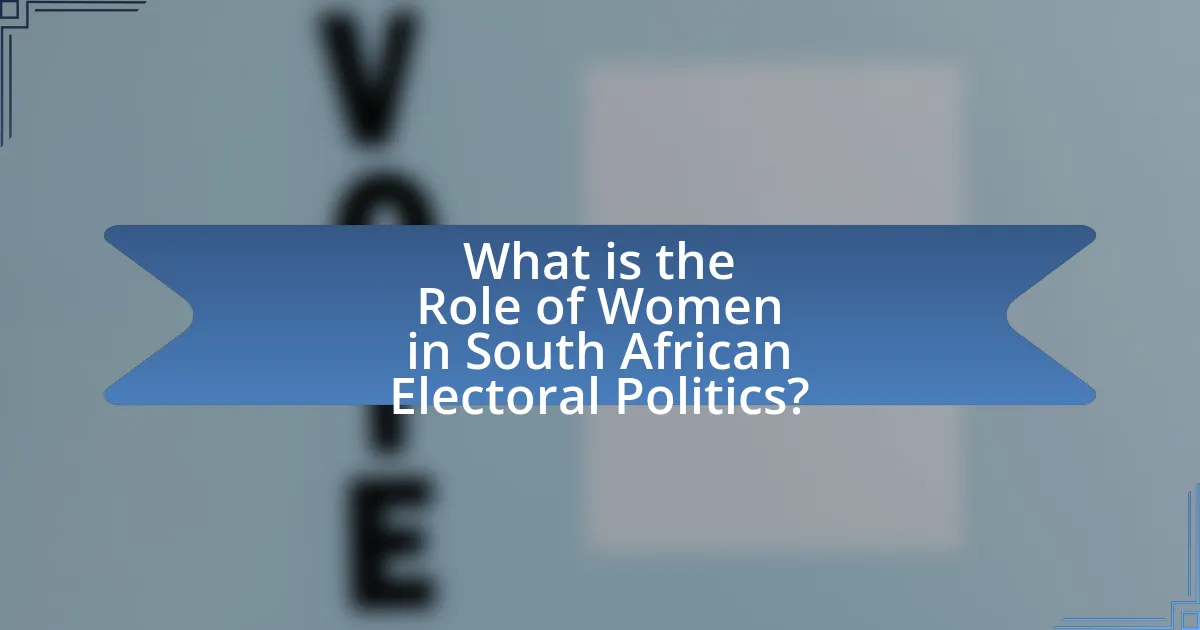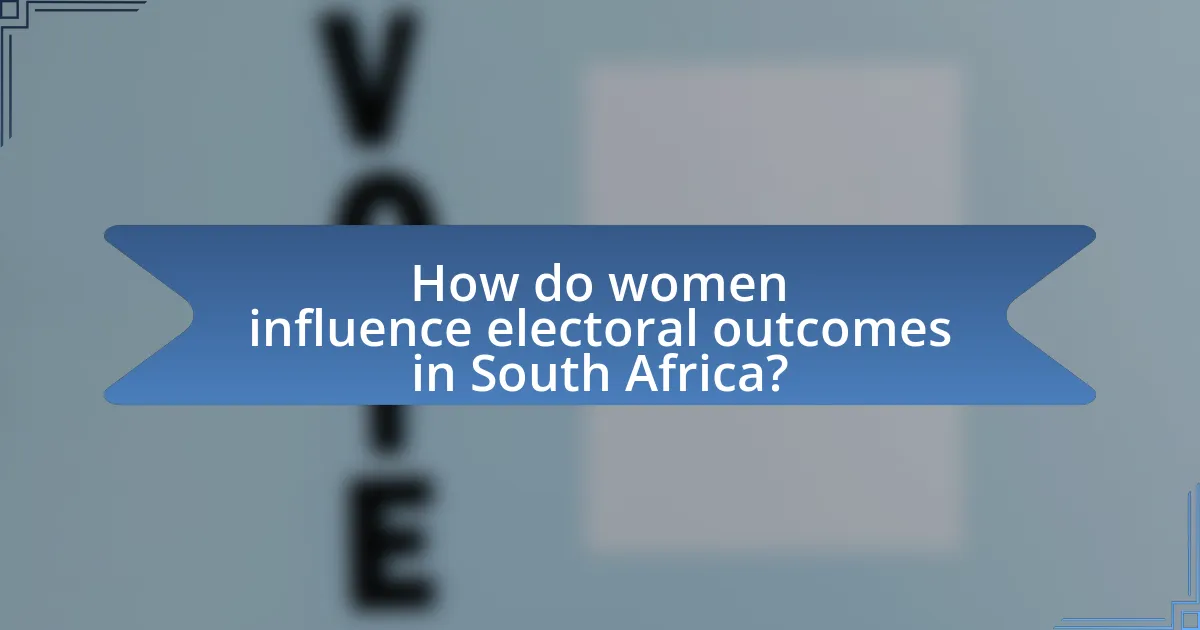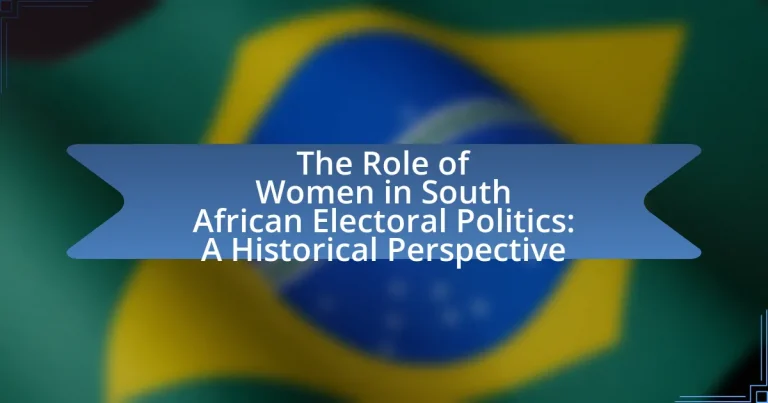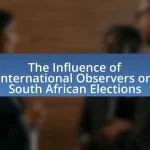The article examines the role of women in South African electoral politics, highlighting their significant influence on policy and representation since the end of apartheid. It details the evolution of women’s participation, from historical exclusion to achieving approximately 46% representation in the National Assembly by 2021, driven by constitutional guarantees of gender equality and advocacy initiatives. Key historical events, societal attitude shifts, and challenges faced by women in politics are discussed, alongside the contributions of notable female leaders and the impact of women voters on electoral outcomes. The article also explores emerging trends in women’s political engagement, the role of technology, and best practices for enhancing women’s participation in governance.

What is the Role of Women in South African Electoral Politics?
Women play a crucial role in South African electoral politics, significantly influencing policy and representation. Since the end of apartheid, women’s participation has increased, with the 1994 elections marking a pivotal moment as South Africa adopted a constitution that guarantees gender equality. As of 2021, women hold approximately 46% of seats in the National Assembly, reflecting a commitment to gender parity in governance. This representation has led to the prioritization of issues such as gender-based violence and women’s rights in legislative agendas, demonstrating the impact of women’s involvement in shaping political discourse and policy outcomes.
How has the role of women evolved in South African electoral politics over time?
The role of women in South African electoral politics has evolved significantly from exclusion to active participation. Initially, under colonial and apartheid regimes, women faced systemic disenfranchisement, with the 1930 Representation of Natives Act limiting voting rights primarily to white men. However, the end of apartheid in 1994 marked a pivotal change, as the new democratic constitution granted equal voting rights to all citizens, including women.
Since then, women’s representation in political structures has increased, exemplified by the African National Congress (ANC) implementing a gender quota system, resulting in women holding 46% of parliamentary seats by 2021. This shift reflects broader societal changes, with women increasingly participating in political activism and leadership roles, such as the appointment of Nkosazana Dlamini-Zuma as the first female chairperson of the African Union Commission in 2012.
These developments illustrate a transformative journey from marginalization to empowerment, highlighting women’s critical role in shaping South Africa’s democratic landscape.
What key historical events have influenced women’s participation in politics?
Key historical events that have influenced women’s participation in politics include the suffrage movements, the establishment of the United Nations, and the anti-apartheid struggle in South Africa. The suffrage movements in the early 20th century, particularly the 1918 Representation of the People Act in the UK and the 19th Amendment in the US in 1920, granted women the right to vote, significantly increasing their political engagement. The establishment of the United Nations in 1945 promoted gender equality as a fundamental human right, leading to initiatives that encouraged women’s political representation globally. In South Africa, the anti-apartheid struggle, particularly the formation of the African National Congress Women’s League in 1931 and the 1994 democratic elections, marked pivotal moments that not only highlighted women’s roles in the fight for freedom but also resulted in increased representation in government, with women holding 27% of parliamentary seats post-1994. These events collectively shaped the landscape for women’s political participation, establishing frameworks for rights and representation.
How have societal attitudes towards women in politics changed in South Africa?
Societal attitudes towards women in politics in South Africa have significantly evolved, particularly since the end of apartheid in 1994. Initially, women faced substantial barriers to political participation, with cultural norms and systemic discrimination limiting their roles. However, the post-apartheid era saw the introduction of policies aimed at promoting gender equality, such as the 1996 Constitution, which guarantees equal rights for all citizens, including women.
As a result, women’s representation in political positions has increased, with women holding 46% of seats in the National Assembly as of 2021, reflecting a growing acceptance of women in leadership roles. Public opinion has also shifted, with increasing support for female politicians and recognition of their contributions to governance and policy-making. This change is evidenced by the rise of prominent female leaders, such as former Minister of Defence Nosiviwe Mapisa-Nqakula and former Minister of Arts and Culture Nathi Mthethwa, who have garnered respect and influence in their respective fields.
Overall, the transformation in societal attitudes is marked by a greater acknowledgment of women’s capabilities in politics, driven by both legislative frameworks and changing cultural perceptions.
What challenges have women faced in South African electoral politics?
Women in South African electoral politics have faced significant challenges, including systemic gender discrimination, underrepresentation in political positions, and socio-economic barriers. Systemic gender discrimination manifests in cultural norms and practices that prioritize male leadership, limiting women’s access to political power. Underrepresentation is evident in legislative bodies, where women often hold fewer than 30% of seats, despite legal frameworks promoting gender equality, such as the 1996 Constitution. Socio-economic barriers, including poverty and lack of education, further hinder women’s political participation, as many struggle to engage in the political process due to financial constraints and limited resources. These challenges collectively impede women’s ability to influence policy and governance effectively.
What legal and institutional barriers have hindered women’s political participation?
Legal and institutional barriers that have hindered women’s political participation include discriminatory laws, lack of access to political networks, and inadequate representation in decision-making bodies. Historically, South Africa’s apartheid regime enforced laws that marginalized women, limiting their ability to vote and hold office. For instance, the 1996 Constitution aimed to promote gender equality, yet women still face systemic challenges such as patriarchal norms and insufficient support for female candidates. According to the Inter-Parliamentary Union, as of 2021, women held only 46% of parliamentary seats in South Africa, indicating ongoing institutional obstacles to achieving gender parity in politics.
How have cultural norms impacted women’s roles in politics?
Cultural norms have significantly impacted women’s roles in politics by reinforcing traditional gender roles that often limit women’s participation and representation. In South Africa, historical patriarchal structures have marginalized women, leading to underrepresentation in political offices. For instance, prior to the end of apartheid, women were largely excluded from political decision-making processes, as cultural beliefs prioritized male authority in both public and private spheres. This exclusion was evident in the low percentage of women in leadership positions, which was only 27% in the National Assembly in 1994. Furthermore, cultural expectations surrounding women’s responsibilities in the home have perpetuated the notion that political engagement is secondary to domestic duties, further hindering their political involvement.
What contributions have women made to South African electoral politics?
Women have significantly contributed to South African electoral politics by advocating for gender equality, participating in political leadership, and influencing policy reforms. Historically, women played a crucial role in the anti-apartheid movement, with figures like Helen Joseph and Lilian Ngoyi leading protests and mobilizing support for democratic rights. The 1994 elections marked a pivotal moment, as women constituted 27% of the new parliament, a figure that has since increased, showcasing their growing influence. Additionally, the establishment of gender quotas in political parties has further enhanced women’s representation, leading to legislative advancements such as the Promotion of Equality Act. These contributions underscore the vital role women have played in shaping South Africa’s democratic landscape.
Who are some notable women leaders in South African politics?
Notable women leaders in South African politics include Nkosazana Dlamini-Zuma, who served as the Minister of Health and later as the Minister of Home Affairs, and was the first female chairperson of the African Union Commission. Another prominent figure is Baleka Mbete, who has held positions such as Deputy President and Speaker of the National Assembly. Additionally, Helen Zille, as the former Premier of the Western Cape and leader of the Democratic Alliance, has played a significant role in opposition politics. These women have contributed to shaping South Africa’s political landscape through their leadership and policy initiatives.
What initiatives have women led to promote gender equality in politics?
Women have led various initiatives to promote gender equality in politics, including the establishment of organizations such as the Women’s League of the African National Congress (ANC) and the formation of advocacy groups like the Gender Links. These initiatives focus on increasing women’s representation in political offices and influencing policy-making processes. For instance, the Women’s League of the ANC has been instrumental in advocating for gender quotas within the party and supporting female candidates in elections, contributing to a significant rise in women’s participation in South African politics, which reached 46% in the National Assembly as of 2021. Additionally, Gender Links has worked on campaigns to raise awareness about gender-based violence and its impact on women’s political participation, further solidifying the role of women in shaping political discourse and policy in South Africa.

How do women influence electoral outcomes in South Africa?
Women significantly influence electoral outcomes in South Africa through their voting power and participation in political leadership. As of the 2019 elections, women constituted approximately 51% of the electorate, demonstrating their critical role in shaping electoral results. Furthermore, women’s representation in political offices has increased, with South Africa ranking among the top countries globally for female parliamentary representation, at around 46%. This representation not only impacts policy decisions but also encourages voter turnout among women, as they are more likely to vote for candidates who advocate for gender equality and women’s rights. Studies show that when women hold leadership positions, they prioritize issues such as healthcare, education, and social welfare, which resonate with a significant portion of the electorate, thereby influencing electoral outcomes.
What role do women voters play in elections?
Women voters play a crucial role in elections by significantly influencing electoral outcomes and shaping political agendas. In South Africa, women constitute a substantial portion of the electorate, with statistics indicating that they made up approximately 52% of registered voters in the 2019 national elections. This demographic power allows women voters to sway election results, as seen in various instances where their collective preferences have led to the election of candidates who prioritize gender equality and women’s rights. Furthermore, women’s participation in voting reflects broader societal changes and demands for representation, impacting policy decisions and political discourse.
How do women’s voting patterns differ from men’s in South Africa?
Women’s voting patterns in South Africa tend to show higher support for social issues and parties advocating for gender equality compared to men’s voting patterns. Research indicates that women are more likely to prioritize issues such as healthcare, education, and social welfare, which influences their voting behavior. For instance, during the 2019 national elections, women voters showed a significant preference for the African National Congress, which emphasizes social justice and equality, reflecting their alignment with these values. In contrast, men often exhibit a stronger inclination towards economic policies and security issues, leading to different party preferences. This divergence in priorities is supported by studies from the Electoral Institute for Sustainable Democracy in Africa, which highlight these gender-based differences in electoral choices.
What issues are most important to women voters in South African elections?
The most important issues for women voters in South African elections include gender-based violence, economic empowerment, healthcare access, and education. Gender-based violence remains a critical concern, with statistics indicating that one in five women experience violence in their lifetime, prompting calls for stronger legal protections and support systems. Economic empowerment is also vital, as women seek equal opportunities in the workforce, with the gender pay gap remaining a significant issue. Access to healthcare, particularly reproductive health services, is essential for women, as highlighted by the need for comprehensive healthcare policies. Lastly, education is a priority, with women advocating for improved educational resources and opportunities to ensure future generations can thrive. These issues reflect the broader socio-economic challenges faced by women in South Africa and shape their electoral choices.
How do women candidates impact political parties and campaigns?
Women candidates significantly impact political parties and campaigns by enhancing representation and influencing voter engagement. Their participation often leads to increased visibility of women’s issues, which can attract a broader electorate. For instance, research by the Inter-Parliamentary Union indicates that countries with higher female representation in politics tend to prioritize gender equality and social policies, resulting in more comprehensive legislative agendas. Additionally, women candidates can mobilize female voters, as evidenced by the 2019 South African elections, where female candidates contributed to a notable increase in women’s voter turnout. This dynamic not only shifts party platforms but also fosters a more inclusive political environment.
What strategies do women candidates use to engage voters?
Women candidates engage voters through strategies such as grassroots mobilization, leveraging social media, and focusing on community issues. Grassroots mobilization allows women to connect directly with constituents, fostering personal relationships and trust. Social media platforms enable them to reach a broader audience quickly, facilitating discussions and sharing their platforms effectively. Additionally, by prioritizing community issues, women candidates resonate with voters’ concerns, demonstrating their commitment to addressing local needs. Research indicates that women candidates often outperform their male counterparts in voter engagement when they employ these strategies, highlighting their effectiveness in the electoral process.
How do political parties support or hinder women’s candidacy?
Political parties can both support and hinder women’s candidacy through their policies, practices, and internal structures. Support often comes in the form of implementing gender quotas, which have been shown to increase women’s representation; for example, the African National Congress adopted a 50% gender quota for its candidates in 1994, significantly boosting women’s participation in politics. Conversely, hindrance occurs when parties lack commitment to gender equality, fail to provide resources for female candidates, or perpetuate patriarchal norms within their ranks, as seen in various South African political parties where women face challenges in securing leadership positions.
What is the future of women’s participation in South African electoral politics?
The future of women’s participation in South African electoral politics is expected to increase, driven by ongoing advocacy for gender equality and legislative reforms. The South African government has implemented policies such as the Gender Equality Bill and the 50% representation target for women in political parties, which aim to enhance women’s roles in governance. As of the 2019 elections, women constituted 46% of the National Assembly, reflecting a positive trend towards greater representation. Continued efforts by organizations like the African Women’s Development Fund and the Women’s League of the African National Congress further support this trajectory, indicating a commitment to empowering women in political spaces.
What trends are emerging in women’s political engagement in South Africa?
Emerging trends in women’s political engagement in South Africa include increased representation in leadership positions, active participation in grassroots movements, and a growing focus on issues such as gender-based violence and economic empowerment. The representation of women in the South African Parliament has risen to approximately 46% as of 2023, reflecting a commitment to gender parity in political spaces. Additionally, women are increasingly mobilizing through organizations like the Women’s League of the African National Congress and various civil society groups, advocating for policies that address their specific needs. This engagement is further supported by initiatives aimed at educating women about their rights and encouraging them to vote, which has contributed to higher voter turnout among women in recent elections.
How are young women getting involved in politics today?
Young women are increasingly getting involved in politics today through activism, social media engagement, and participation in political organizations. For instance, many young women in South Africa are joining movements like #FeesMustFall and #TotalShutdown, which address issues such as education and gender-based violence. According to a 2021 study by the Institute for Justice and Reconciliation, 60% of young women expressed interest in political participation, highlighting a significant shift towards active engagement in political discourse and decision-making processes. This involvement is further supported by platforms that amplify their voices, allowing them to influence policy and advocate for change effectively.
What role does technology play in enhancing women’s political participation?
Technology significantly enhances women’s political participation by providing platforms for communication, mobilization, and advocacy. Digital tools such as social media enable women to organize campaigns, share information, and connect with like-minded individuals, thereby increasing their visibility and influence in political discourse. For instance, during the 2019 South African elections, social media campaigns played a crucial role in amplifying women’s voices and issues, leading to a greater representation of women in political positions. Additionally, technology facilitates access to information about political processes and candidates, empowering women to make informed decisions and engage actively in electoral politics.
What best practices can be adopted to support women in electoral politics?
To support women in electoral politics, implementing mentorship programs is essential. These programs connect experienced female politicians with emerging leaders, providing guidance and fostering skills necessary for political engagement. Research indicates that mentorship significantly increases women’s confidence and participation in politics, as seen in various global contexts where such initiatives have led to higher representation of women in legislative bodies. Additionally, establishing financial support mechanisms, such as campaign funding specifically for women candidates, can alleviate barriers to entry, as studies show that financial constraints are a major obstacle for women in politics. Furthermore, promoting gender-sensitive policies within political parties can create an inclusive environment that encourages women’s candidacy and leadership roles.
How can political parties create more inclusive environments for women?
Political parties can create more inclusive environments for women by implementing gender quotas and promoting women to leadership positions. Gender quotas, which have been adopted in various countries, ensure that a certain percentage of candidates or elected officials are women, thereby increasing their representation. For instance, South Africa’s Electoral Act mandates that political parties must ensure that at least 50% of their candidates are women, which has significantly improved women’s participation in politics. Additionally, political parties can provide training and mentorship programs specifically designed for women, helping them develop the skills and confidence needed to run for office. Research shows that such initiatives lead to higher rates of female candidacy and success in elections, fostering a more equitable political landscape.
What policies can be implemented to promote gender equality in politics?
To promote gender equality in politics, policies such as gender quotas, financial support for women candidates, and training programs for female political leaders can be implemented. Gender quotas, which require a certain percentage of candidates to be women, have been effective in various countries, leading to increased female representation in legislative bodies. For instance, Rwanda’s implementation of a 30% quota resulted in women holding over 60% of parliamentary seats, showcasing the effectiveness of such policies. Financial support can alleviate the economic barriers women face when running for office, while training programs can equip them with the necessary skills and confidence to engage in political processes. These combined strategies can create a more inclusive political environment, ultimately enhancing gender equality in governance.


